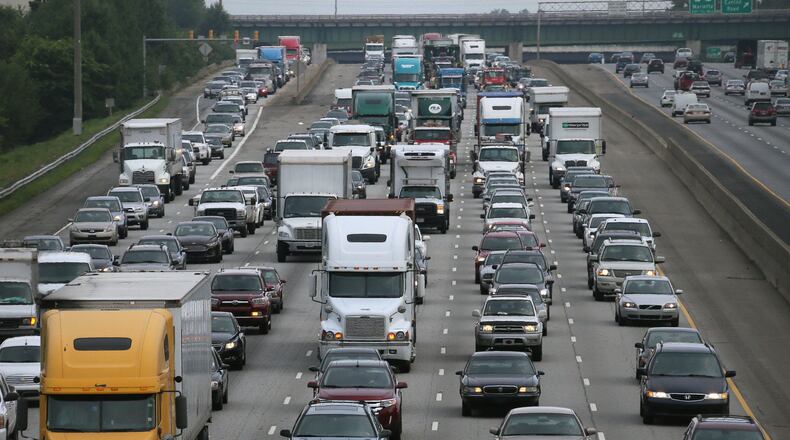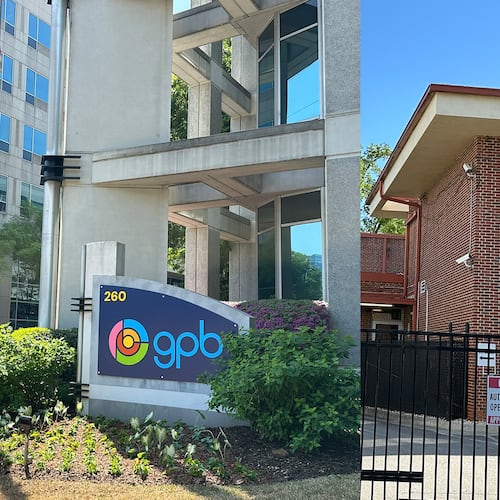Metro Atlanta’s bad traffic, by the numbers
Average commute time in 2014: 34 minutes, up 13.3 percent from 2010
Total hours lost in congestion in 2011: 142 million
Value of lost productivity in 2011: $3.73 billion
Extra fuel used in congestion in 2011: 63.5 million gallons, up 145 percent in a decade
Teleworkers in 2014: 675,000, up 61 percent from 2010
Sources: Texas Transportation Institute, U.S. Department of Transportation, Federal Highway Administration, Regional Commuter Survey, Brookings Institution.
Annual hours of delay per commuter
Atlanta — 51
Charlotte — 40
Chicago — 51
Dallas — 45
Los Angeles — 61
New York — 59
Source: Texas Transportation Institute
Annual congestion cost per commuter
Atlanta — $1,120
Charlotte — $898
Chicago — $1,153
Dallas — $957
Los Angeles — $1,300
New York — $1,281
Source: Texas Transportation Institute
Annual hours of delay per commuter
Atlanta — 51
Charlotte — 40
Chicago — 51
Dallas — 45
Los Angeles — 61
New York — 59
Source: Texas Transportation Institute
Annual congestion cost per commuter
Atlanta — $1,120
Charlotte — $898
Chicago — $1,153
Dallas — $957
Los Angeles — $1,300
New York — $1,281
Source: Texas Transportation Institute
With 10 offices and hundreds of employees now scattered across metro Atlanta, financial services giant Fiserv decided to bring its staff under one roof in a move to Alpharetta later this year.
But in metro Atlanta, where choked roads are a bigger nuisance than kudzu, traveling to Fiserv’s new digs may be painful, especially for those who use the already overburdened Ga. 400.
So the company, working with Georgia Commute Options, is ramping up options to ease the trek, including connecting employees to van pools and carpools, offering work hour flexibility and encouraging telecommuting for those who don’t need to be in the office every day.
“Our objective is to get the best out of our people everyday,” said Kevin Pennington, Fiserv’s chief human resources officer. “I don’t think you do that treating them as chattel.”
It’s a strategy companies across metro Atlanta are using as the area’s traffic congestion increasingly shapes everything from who gets hired to where businesses locate, experts say.
What was an average one-way commute of 17 miles and 30 minutes just five years ago grew into an average commute of 18 miles and 34 minutes in 2014.
That might not sound like much, but the Texas Transportation Institute estimates metro Atlanta’s congestion costs more than $3.1 billion annually, a figure that includes the value of time spent on the road, the fuel they burn and the environmental cost of adding more carbon dioxide to the air.
That’s huge for a metro economy of roughly $300 billion whose growth is only 1 percent or 2 percent per year.
Frayed nerves
Not to mention the impact traffic has on frayed nerves.
“It’s not the driving distance that puts employees in stressful situations, it’s the time just sitting that is the problem,” says Julie Weith Smith, president and chief executive officer of recruiting firm Custom Human Resource Solutions, which has offices in Atlanta and Los Angeles.
That has employers looking closely at not only a job candidate’s skills, but where he lives, Smith said. Live too far away from the job and you might end up in the rejection pile, she said.
The reasoning: traffic may make a worker chronically late or prompt them to find a job closer to home, wasting a company’s investment in training and other expenses.
How traffic affects an employee depends on the job, said Rajeev Dhawan, director of the Economic Forecasting Center at Georgia State University. Traveling a great distance for long periods of time doesn’t make economic sense in lower-paying jobs. That changes when there is a greater financial incentive.
“If you are coming from downtown and going to Alpharetta for a service job, it doesn’t pay,” Dhawan said. “But if you are an executive, a high-level job, it pays. If you are living in Newnan, you won’t go to Alpharetta for a job that pays 35 grand. But if it’s $235,000, you’ll be commuting.”
Some lower-paid positions, such as those in the hotel, restaurant and retail industry, are in areas where workers can’t afford to live, Emory University labor economist Tom Smith said. That makes being stuck in traffic more difficult because the cost-benefit ratio is low.
How companies bear traffic costs also varies. For instance, a metro Atlanta trucking company may try to pass along fuel expenses incurred for delays in making deliveries, but it risks losing business to competitors if its prices are too high.
A massive delivery company like Sandy Springs-based UPS may hesitate to raise prices, so it cuts wastes and costs by using technology to guide — and monitor – drivers.
Employees bear cost
Still, much of the cost is typically borne by employees. A pizza delivery person, for example, sets no prices but often provides his or her own vehicle. Congestion means fewer and slower deliveries, which means fewer and smaller tips. And most employees who commute get no subsidy for it from their employers.
That means the congestion dampens the demand side of the economy since, for consumers, congestion trims disposable income, in the fuel they burn crawling along or idling in traffic, in the car repairs that come a bit more frequently, the tires that need replacing more often, the insurance and registration costs they wouldn’t need at all but for the vehicle.
In metro Atlanta, where logistics are crucial, congestion costs are no small thing.
A California study found that adding a car to traffic during off-peak hours has no cost because it does not affect speed, according to Christopher R. Knittel, professor of energy economics at the Massachusetts Institute of Technology.
But when the highway is clogged, each additional car slows traffic down just a little more.
Researchers found that every car crawling along a mile of congestion added general costs that included lost productivity, wasted fuel and road damage, Knittel said.
“That is the value of your presence on the road – you are costing society $1 per mile,” he said.
Many cities have bad traffic. While Atlanta’s traffic is congested roughly five hours a day, New York’s is congested an hour and 45 minutes longer, according to the Texas Transportation Institute. Washington D.C. averages seven hours of congestion a day and Los Angeles chalks up eight hours.
By comparison, congestion in Rochester, N.Y., Toledo, Ohio, and Wichita, Kan., average 2.5 hours.
Expectations differ
“It’s a case of expectations,” Dhawan said. “If you are coming from New York or New Jersey and you are commuting an hour and a half each way, that is considered normal. That is not ‘congestion.’”
But metro Atlanta motorists and employers alike have long complained that the area’s traffic problems are exacerbated by a largely anemic public transportation system. Add to that the lack of a grid system to offer relief with parallel roads and you have the recipe for baked-in gridlock.
That could be changing. Several businesses such as NCR and insurance giant State Farm are locating offices in Midtown and Dunwoody respectively to be closer to Marta. The moves are designed to make it easier for commuters as well as to attract millennials, who prefer public transportation or living closer to work.
Natalie Dale, a spokeswoman for the Georgia Department of Transportation, said companies also are embracing telecommuting more today than they have in the past. In 2010, there were 420,000 workers who teleworked at least once a month in metro Atlanta. That number rose to 675,000 last year.
The resistance stemmed from an inability to account for the productivity of a worker who wasn’t in the office, she said. Technology has made it easier to gauge work, erasing the stigma, she said.
“It’s a perk to be able to do what you love with some flexibility,” she said.
About the Author
Keep Reading
The Latest
Featured



